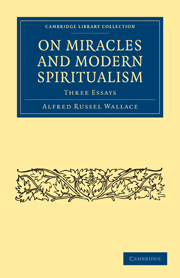Book contents
- Frontmatter
- Contents
- Dedication
- PREFACE
- I AN ANSWER TO THE ARGUMENTS OF HUME, LECKY, AND OTHERS AGAINST MIRACLES
- II THE SCIENTIFIC ASPECT OF THE SUPERNATURAL—
- 1 Introductory
- 2 Miracles and Modern Science
- 3 Modern Miracles viewed as Natural Phenomena
- 4 Od-Force, Animal Magnetism, and Clairvoyance
- 5 The Evidence of the Reality of, Apparitions
- 6 Modern Spiritualism: Evidence of Men of Science
- 7 Evidence of Literary and Professional Men to the Facts of Modern Spiritualism
- 8 The Theory of Spiritualism
- 9 The Moral Teachings of Spiritualism
- 10 Notes of Personal Evidence
- III A DEFENCE OF MODERN SPIRITUALISM
- APPENDIX
- INDEX
6 - Modern Spiritualism: Evidence of Men of Science
Published online by Cambridge University Press: 29 August 2010
- Frontmatter
- Contents
- Dedication
- PREFACE
- I AN ANSWER TO THE ARGUMENTS OF HUME, LECKY, AND OTHERS AGAINST MIRACLES
- II THE SCIENTIFIC ASPECT OF THE SUPERNATURAL—
- 1 Introductory
- 2 Miracles and Modern Science
- 3 Modern Miracles viewed as Natural Phenomena
- 4 Od-Force, Animal Magnetism, and Clairvoyance
- 5 The Evidence of the Reality of, Apparitions
- 6 Modern Spiritualism: Evidence of Men of Science
- 7 Evidence of Literary and Professional Men to the Facts of Modern Spiritualism
- 8 The Theory of Spiritualism
- 9 The Moral Teachings of Spiritualism
- 10 Notes of Personal Evidence
- III A DEFENCE OF MODERN SPIRITUALISM
- APPENDIX
- INDEX
Summary
We have now come to the consideration of what is more especially termed “modern spiritualism,” or those phenomena which occur only in the presence, or through the influence, of peculiarly constituted individuals, hence termed “mediums.” The evidence is here so abundant, coming from various parts of the world, and from persons differing widely in education, tastes, and religion, that it is difficult to give any notion of its force and bearing by short extracts. I will first adduce that of three men of the highest eminence in their respective departments—Professor De Morgan, Professor Hare, and Judge Edmonds.
Augustus De Morgan, many years Professor of Mathematics, and latterly Dean of University College, London, was educated at Cambridge, where he took his degree as 4th wrangler. He studied for the bar, and has been a voluminous writer on mathematics, logic, and biography. He was for eighteen years Secretary to the Royal Astronomical Society, and was a strong advocate for a decimal coinage. In 1863, a work appeared entitled “From Matter to Spirit, the result of ten years' experience in Spirit Manifestations,” by C. D., with a preface by A. B. It is very generally known that A. B. is Professor De Morgan, and C. D. Mrs. De Morgan. The internal evidence of the preface is sufficient to all who know the Professor's style; it has been frequently imputed to him in print without contradiction, and in the Athenœum for 1865, in the “Budget of Paradoxes,” he notices the work in such a manner as to show that he accepts the imputation of the authorship, and still holds the opinions therein expressed.
- Type
- Chapter
- Information
- On Miracles and Modern SpiritualismThree Essays, pp. 80 - 90Publisher: Cambridge University PressPrint publication year: 2009First published in: 1875

